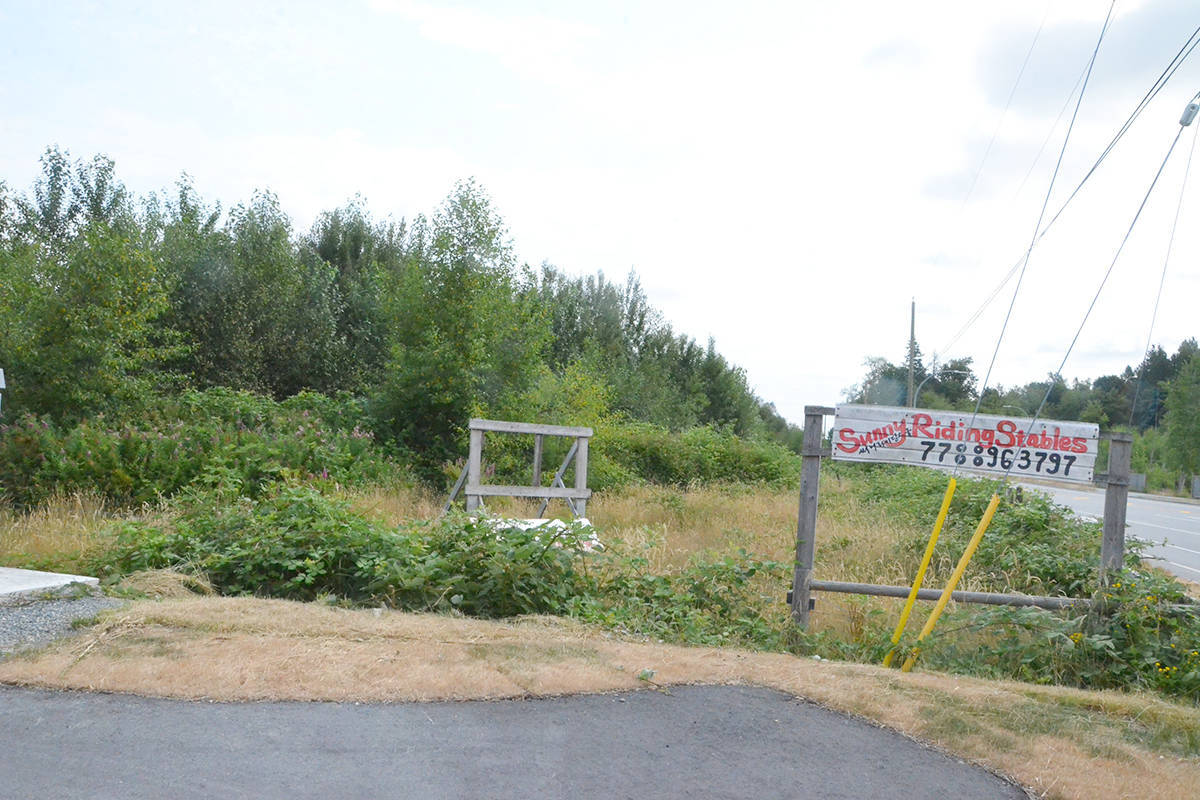Langley Township will have to increase the amount it paid for a 32-acre rural property to $10.5 million – but not to the $26.5 million the owners wanted.
Albert Jen-Tan Chen and Ginger Lan-Ying Hsu took the township to court, claiming that the Township had underpaid when it expropriated the lot at the northeastern corner of 80th Avenue and 216th Street in July of 2017.
The site, which has hosted a riding stables and has been used to raise chickens and produce in recent years, is in the Agricultural Land Reserve, but it is just across 216th Street from the Williams neighbourhood, an area that is expected to develop into commercial and light industrial uses.
According to Justice Jasvinder Basran’s Jan. 31 ruling in B.C. Supreme Court in Vancouver, the Chen family had tried to extract the land from the ALR in 2010, and had been denied by the Agricultural Land Commission (ALC), on the grounds that the site had “prime agricultural capability” and that developing the site would negatively impact surrounding farm properties.
However, the Chens believed that there was still a chance to get the land out of the ALR, thus dramatically increasing its value. The land was in an area designated by the Township for a “university district” around Trinity Western University. The Township had signed a memorandum of understanding with TWU in 2015 to “develop healthy and complete communities” to serve the university’s expansion plans.
Within a few years of its creation, plans for any serious expansion or development around TWU were largely on the back burner – and the ALC showed in other decisions that the Township’s university district plans would have no impact on how it managed farmlands in the area.
Although the Township’s plans for a university district were going nowhere, staff kept an eye on the property to see if it came up for sale. It was being considered for use as a future park.
In the spring of 2017, the Chens put the property on the market, asking for $27 million.
It wasn’t long before they got an offer of $18.5 million from Desert Properties, a developer owned by Ken Mitchell, who was already the owners of land to the west in the Williams neighbourhood. The Chens counter-offered at $20 million, and Mitchell accepted.
Seeing that the land was for sale, the Township offered $6,275,000, and the council authorized staff to expropriate the land for that price if negotiations failed. On July 13, 2017, they moved to expropriate.
Expropriation allows governments to buy land at fair market value, even if the owner does not want to sell, to use for roads, parks, or other public purposes.
According to Justice Basran, the Desert Properties offer was contingent on the development potential of the property. After agreeing to a purchase contract on Aug. 10, Desert Properties backed out of the deal on Aug. 20, saying that there was little chance the Township would support excluding the land from the ALR. That would make the property impossible to develop as housing projects, commercial, or industrial land.
The Township later increased its valuation of the land to more than $7 million and paid the Chens the difference from the original price, plus more than $200,000 in interest. In total, the Township has paid $7,645,000.
But the Chens took the Township to court, arguing that the property was worth somewhere between $20 million and $26.5 million.
They argued that in 2017, they could have had the property removed from the ALR. That would have dramatically increased its value.
Justice Basran was skeptical of that argument.
No neighbouring properties had been successfully excluded from the ALR, there was no evidence that the Township would have supported an exclusion, and even if they had, the ALC had denied some Township-supported exclusions in the past. There was also no evidence that the university district was gaining traction or that TWU or any other school had any interest in the site, Basran wrote.
“In my view, it is probable that the ALC would have rejected any new exclusion application,” he wrote.
However, he did find that the Township had underpaid.
Despite its status as farmland, the 2022 report said the property was valuable in the long term as a “holding property” because of its location near a growing neighbourhood and a highway interchange.
Justice Basran found that the desirable location and rapidly-rising real estate prices in Langley during 2017 meant the land was worth $10.5 million.
He ordered the Township to pay the Chens $2,855,000, the difference between what they have already paid and the new valuation, plus interest.
The Township’s plans for the site include using it as a passive park in the near future. In the long term, the Township’s plan was to develop the site into a community park with playing fields and a field house. That would require permission from the ALC.
In 2021, a leaked internal memo revealed that the Township had also considered transforming the site into a horse racing or harness racing facility, potentially replacing Hastings Park or Fraser Downs.
Mayor Eric Woodward said he could not speak to the legal aspects of the case, but he was pleased to see that the case had been decided largely in the Township’s favour.
If the council and the Chens choose not to appeal, the $2.8 million will likely come from a land capital fund, and won’t affect other projects, he said.
READ MORE: Horse racing track replacing Hastings Park, Fraser Downs considered for Langley
READ MORE: Family-owned riding stable uncertain what happens if Langley site becomes race course

